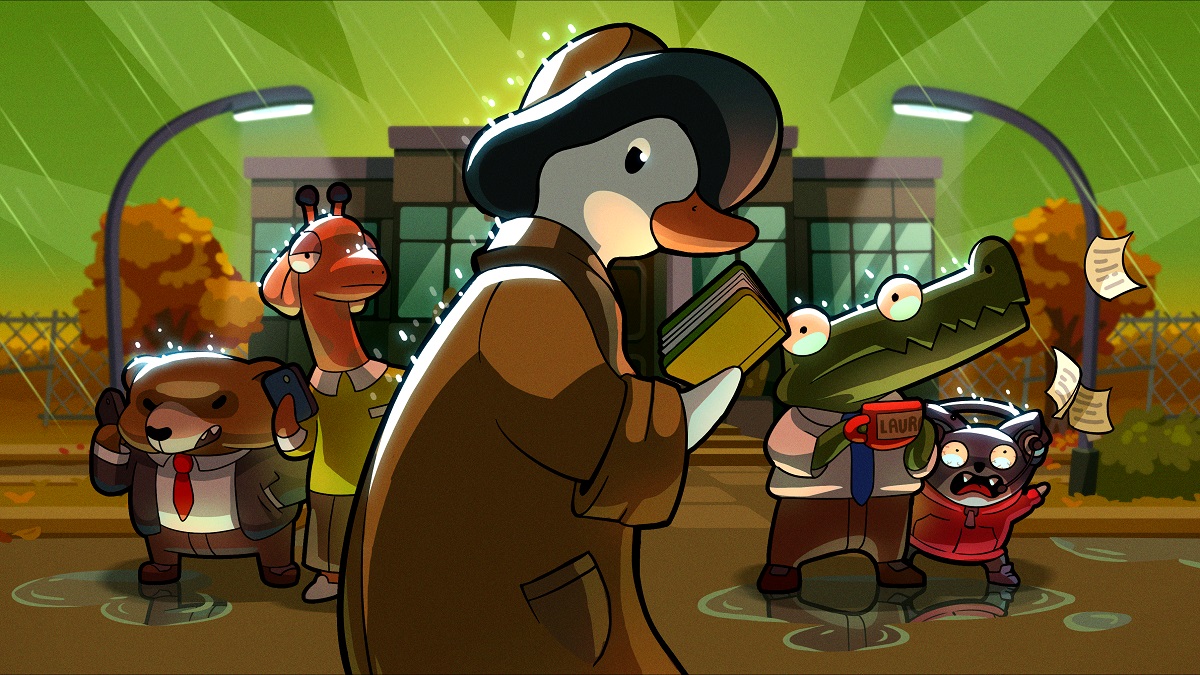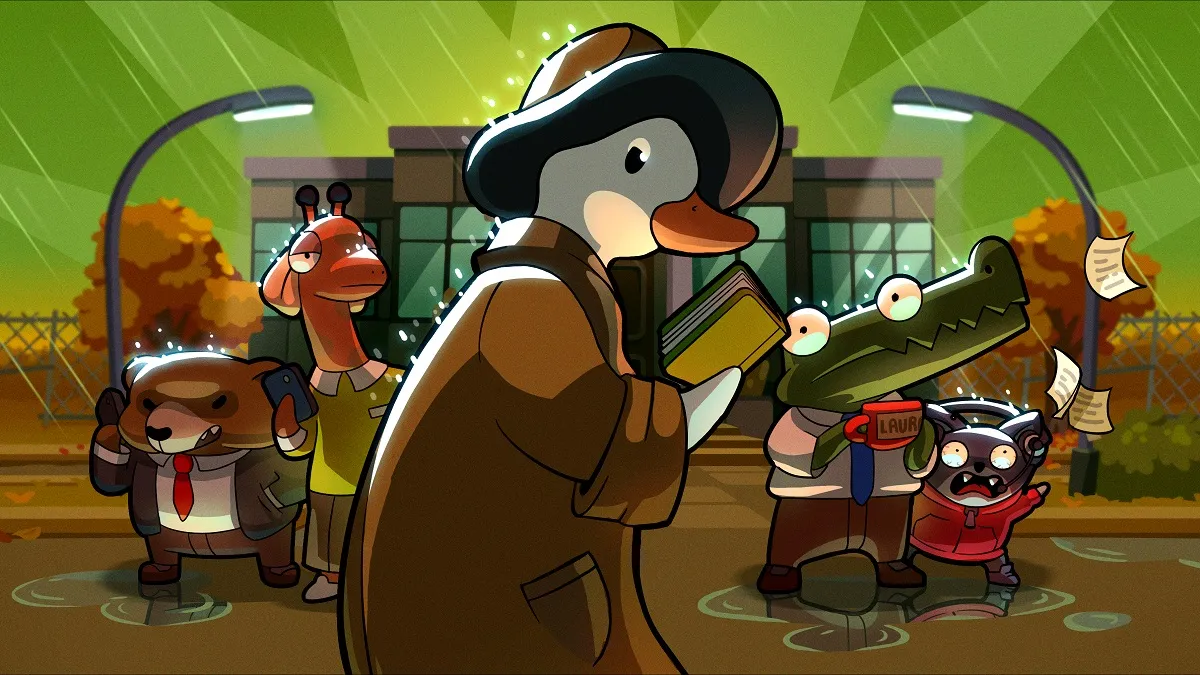I love detective games because for a brief fleeting moment, they make me feel intelligent. It doesn’t matter how long it takes me or how many things I rub on other things to try and make progress. I eventually solve the case and outsmart a game designed for me to outsmart.
Duck Detective: The Secret Salami promised this in a healthy, low-calorie bite. Of its bullet points, it proudly states that it’s 2-3 hours long. I can handle that. I’m often conscious for at least 2-3 hours a day. That, like, half a Tangle Tower!

Duck Detective: The Secret Salami (PC [Reviewed], Switch, Xbox One)
Developer: Happy Broccoli Games
Publisher: Happy Broccoli Games
Released: May 23, 2024 (PC, Switch) TBA (Xbox)
MSRP: $9.99
The story opens with our recently divorced hero waking up from a night of bread-addiction relapse. There’s maybe some former glory there. He might have written a book. A lot of this is mentioned kind of off-hand. Which you’d maybe expect from a game that’s trying to be as brief as possible.
Weirdly, though, it still has a slow start.
As the Duck Detective, you need to gather the clues. All of them. You waddle around the office of Bearbus, using every action on every well-marked interactive object. Once you have enough clues, you can then crack open the “Deducktions” menu and start putting together the pieces. It’s kind of like Mad Libs, but you’re slotting evidence into all the blanks.
This process is so mechanical that it’s extremely jarring when The Secret Salami asks you to actually make a real deduction or eke out meaning from a small change in the environment. I’ve played much more complex investigation games, but I had to stop myself a couple of times and remind myself that it’s not just picking up words and putting them in a scrapbook.
It’s really tempting to play it that way, however. Your progress is based entirely on these deductions. It tells you how many clues you have in a particular subject, and once it’s full, it feels like you must know everything. But then you switch over and realize it’s asking you to deduce something that hasn’t really been directly pointed out as important. It gives you subjects that you might not have even registered as important. Sometimes it’s things that aren’t important. Ever.
So, sometimes, you’re faced with something that seems poorly defined or completely irrelevant. There’s no penalty to start slotting in the wrong words into the deducktions, so you can just keep trying different combinations until the game lets you proceed.
You don’t need to do this, as you can always ask for a hint, which takes the form of the Duck Detective musing to himself. Duck Detective at least lives up to its philosophy. It really wants you to make it all the way to the end. There’s even an easier mode if you want to get more specific hints. It’s just unfortunate that all these safety nets were set up, rather than creating consistently intuitive puzzles.
A good example is an early deducktion where it asks you what is going on in the kitchen. It isn’t that there are no hints, it’s just that there’s a lot of misdirection. You’re supposed to deduce that it’s a surprise birthday party, but it’s earlier established that the character is sad everyone forgot. It was a puzzle on its own. Okay, that’s fair. It’s a surprise. However, in the kitchen is a poster that says the Halloween party has been canceled, and it’s suggested that it’s because of funding, with the Duck Detective remarking that office parties are a bad idea anyway. So, why set that up in my mind and then expect me to immediately figure out that the person standing in the kitchen with a whisk in hand is making a cake for a surprise birthday party? As I said, there are clues, but it’s not set up intuitively.
It doesn’t matter though, because the deducktion is only there for progression. It’s completely irrelevant to the case. It’s just not the only instance that this happens.

And for that matter, the story has no teeth. I’m tempted to say it isn’t very good, but I don’t think that’s accurate. The narrative itself is fine, even if it’s slow to get to any interesting wrinkles. However, the dialogue, the characters, and the worldbuilding are all extremely limp.
The office of Bearbus is at least well-realized. Having worked several years in an office environment, the relationships and frustrations between all the characters feel extremely familiar.
In terms of the character, it’s again not that there’s a complete lack of development. Tidbits of backstory are given and does some service in making the characters feel believable. However, very little of it gets tied into the case in a satisfying way. Motivation is poorly defined to the point where it’s hard to care about anyone. At the end of it all, it feels really inconsequential. With the thieved lunch being the focal point, that’s maybe the intention, but it doesn’t really lead to anything memorable.
The dialogue is sometimes amusing but rarely funny. What got the biggest chuckle out of me was the duck “facts” that get flashed on the loading screens. The dialogue is never ever that clever. Possibly because the characters aren’t set up to be that interesting or insightful.
In terms of worldbuilding, there’s an attempt at creating a sense of place. However, not enough effort goes into it to make it really believable outside the walls of the office.

The art holds up a lot better. While the overall paper-craft look is mostly serviceable, the still-frame art is excellent. This is best shown off during moments where you take a closer look at a character or object in the environment. As you pass your cursor over the image, the magnifying glass depicts the same object in higher detail. You notice fine lines, subtle facial expressions, and fabric stains. It’s well done.
But aside from that, Duck Detective: The Secret Salami delivers on its philosophy too well. It’s an easygoing detective game, sure, but its design feels similarly laid-back. It doesn’t feel like it reaches to excel very often. It doesn’t excite, it doesn’t provoke thought, and it doesn’t linger on the tongue. And there’s something to be said about a game like that. Not everything needs to be a revelation. Sometimes, you just need something that you can file away after you quack the case.
[This review is based on a retail build of the game provided by the publisher.]









